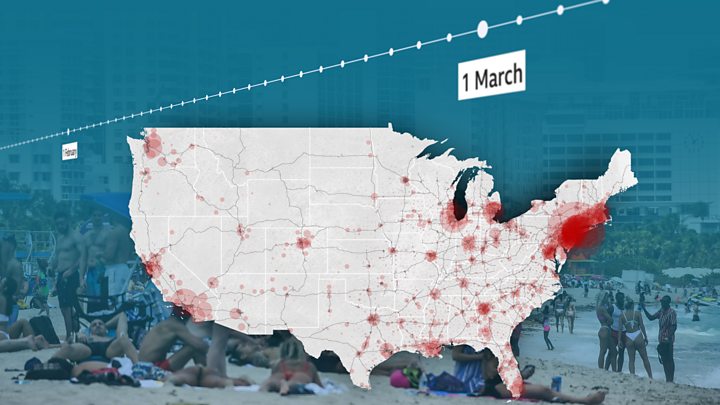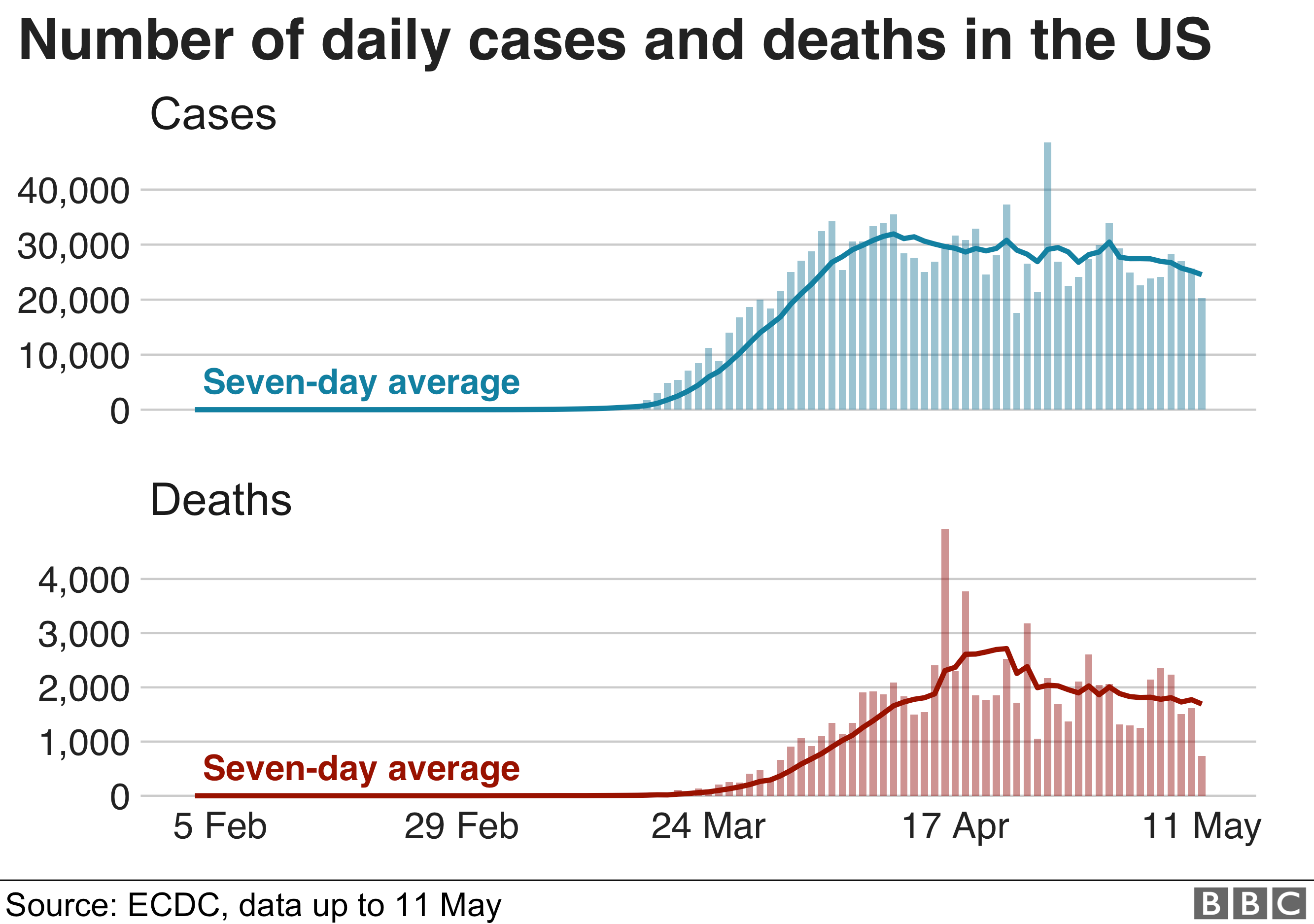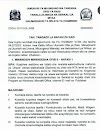The top US infectious diseases doctor has warned senators the virus will spread if the country opens up too soon.
Dr Anthony Fauci said if federal guidelines to reopen are not followed, "little spikes" will become outbreaks.
He also said the real US death toll is probably higher than the official figure of 80,000.
His message is at odds with the upbeat tone of President Trump who is keen to get the economy going again.
Dr Fauci was speaking via video to a Republican-led committee of the US Senate.
He was referring to the White House's Opening Up America Again plan, which includes three 14-day phases that states are urged to consider implementing as they allow schools and businesses to reopen.
Several US states already restarting their economies have infection rates that are rising, not falling.
He warned of the risk of triggering an outbreak that officials would not be able to control, adding that such an outbreak would set back economic recovery and could lead to "suffering and death".
Although the White House has laid out guidelines for reopening, it is ultimately up to state governors to make the decisions on how to ease the lockdown.
"There is no doubt, even under the best of circumstances, when you pull back on mitigation you will see some cases appear," Dr Fauci warned the US officials.
ADVERTISEMENT
'Cautiously optimistic'
Questioned about the possibility of a rebound in autumn of the virus, Dr Fauci said one is "entirely conceivable and possible".
"I hope that if we do have the threat of a second wave we will be able to deal with it very effectively to prevent it becoming an outbreak."
Dr Fauci also said there are multiple vaccines in development but "no guarantee" any will be effective, though based on his knowledge of other viruses, he is "cautiously optimistic".
"We have many candidates and hope to have multiple winners," he said. "In other words it's multiple shots on goal."
Witnesses testify remotely
Witnesses appeared remotely during the over three-hour long hearing, as did some senators on the Senate Committee on Health, Education Labor and Pensions.
The three members of the White House coronavirus task force who testified are self-isolating after possible exposure to the illness, including Dr Fauci.
Centers for Disease Control and Prevention director Dr Robert Redfield and Food and Drug Administration commissioner Stephen Hahn are also self-isolating.
Dr Fauci has tested negative but will continue to work from home for the time being, and will be regularly tested.
The hearing was led by Republican Tennessee Senator Lamar Alexander from his home in the Smoky Mountains. His dog Rufus was occasionally seen slumbering in the background of the video conference call.
"Staying at home indefinitely is not a solution to this pandemic," said Mr Alexander, adding: "There is not enough money available to help all of those hurt by a closed economy."
Washington Senator Patty Murray, the highest-ranking Democrat on the committee, charged that Mr Trump is more interested in "fighting against the truth than fighting the virus".
The government cannot ask people to restart their lives "if there isn't clear detailed guidance on how to do that safely", she adds.

Meanwhile, Vice-President Mike Pence is also keeping his distance from the president after his press secretary Katie Miller tested positive last week.
"The vice-president has made the choice to keep his distance for a few days," said White House press secretary Kayleigh McEnany.

Anthony Fauci's testimony before a congressional committee started as a genteel affair, with senators treating him as a long-serving public health official whose advice carries considerable authority and expertise.
Then Senator Rand Paul spoke.
When it comes to the coronavirus, the Republican from Kentucky said, public heath experts had made "wrong prediction after wrong prediction after wrong prediction".
"As much as I respect you, Dr Fauci," he continued, "I don't think you're the end-all, I don't think you're the one person that gets to make a decision."
Mr Paul went on to assert that "outside of New England", the virus has followed a "relatively benign course". He told Fauci that schools, which have been closed across the US since mid-March, should be reopened as soon as possible.
Mr Paul was giving voice to a growing sentiment among the conservative base that Dr Fauci does not have the nation's - or the president's - best interests in mind.
Crowds of anti-lockdown activists in several states have chanted "fire Fauci", and the director has required special protection after receiving death threats. They, like Mr Paul, have dismissed the spread of the virus beyond the current coastal hotspots, even though data indicates cases are spiking in some areas in the interior of the US.
It's evidence of a growing political divide within the nation over how to respond to the virus and how, and when, to begin easing from existing state-ordered mitigation efforts.
Dr Fauci, for his part, responded coolly.
"I have never made myself out to be the end-all and only voice of this," he told Mr Paul. "I'm a scientist, a physician, and a public health official."
He added that there is still much that is not known about the virus, and warned not to be "cavalier" about the threat to children, given new evidence that they may not be "completely immune to the deleterious effects" of the virus.
Dr Paul, a practising physician, was himself diagnosed with the coronavirus last month and received significant criticism for continuing to work in the Senate after being exposed but before he received his positive diagnosis.
ADVERTISEMENT

Some US states are beginning to lift lockdown orders. Republican-run states such as Georgia, Oklahoma and Alaska have moved first towards relaxing restrictions.
Tuesday's hearing was Dr Fauci's first appearance before lawmakers since President Donald Trump declared a state of national emergency in March.
The senior health adviser - who has become the public face of the fight against the virus in the US - was blocked from testifying to a Democratic-led House committee examining the Trump administration's response to the pandemic on May 6.
What's the situation like in the US?
The United States alone has more than 1.3 million confirmed cases, according to the Johns Hopkins University coronavirus tracker - almost six times as many as any other country.
President Trump claimed that the US had "prevailed" in testing people for coronavirus infections in a news conference on Monday.

But as of this week, the US has tested only 2.75% of its 330m population, and no state has tested 10% of residents.
In a separate development, White House staff have been ordered to wear masks when entering the West Wing after two aides tested positive for coronavirus.
Mr Trump said he did not need to follow the directive as he kept "far away from everyone".










0 Comments